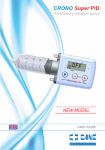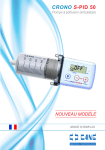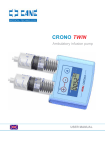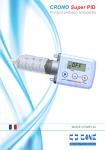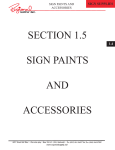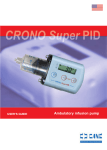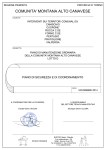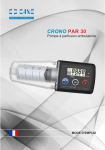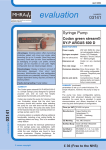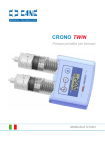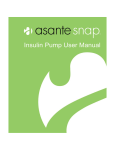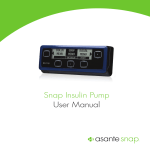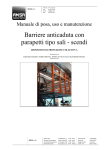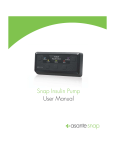Download CRONO 30
Transcript
CRONO 30 Ambulatory Infusion Pump USER GUIDE Canè S.p.A. Medical Technology Via Cuorgnè 42/a 10098 Rivoli (TO) Italy Tel.+39 011 9574872 - Fax +39 011 9598880 www.canespa.it - [email protected] Manual code: MAN 01/EN/03 CRONO 30 Publication date: 06/14 3 CRONO 30 Key-pad lock-out instructions NOTICE Confidential Information only to the physician The pump has a key-pad lock-out function in order to avoid non authorised or accidental variations of the selected parameters; if it is opportune that the patient not be able to change the pump settings it is advised that this information not be divulged to the him/her. The device is supplied with the key-pad lock-out level 0. KEY-PAD LOCK-OUT Three different levels may be set: 0,1,2. The levels are useful to avoid undesired operation, and they actually lock-out the key-pad. • Level 0 means no restriction. • Level 1 does not allow you to select: - infusion time; - enable/disable the end of infusion acoustic signal • Level 2 does not allow you to select: -- infusion time; - partial volume; - complete forced retraction of the pusher”; - enable/disable the end of infusion acoustic signal KEY-PAD LOCK-OUT SETTING In order to set the level key-pad lock-out you need to follow the procedure below: Pump in OFF condition. Display OFF. Press the button for about 5 seconds; the device will utter the sound ticking of pressed push-button. The display will read the number of delivered infusions. Without releasing the button, press the button as well. The display will read the flashing indication of the level previously set. Acting on and buttons you may increase or decrease the value of the key-pad lock-out level. PROG PROG PROG The key-pad lock out level is stored even after removing the battery. Canè S.p.A. Medical Technology Via Cuorgnè 42/a 10098 Rivoli (TO) Italy Tel.+39 011 9574872 - Fax +39 011 9598880 www.canespa.it - [email protected] WARNING The pump has a function of key-pad lock-out in order to avoid non authorised or accidental variations of the selected parameters; if it is opportune that the patient not be able to change the pump settings it is advised that this information not be divulged to the him/her. The device is supplied with the key-pad lock-out level 0. The information concerning the operation of key-pad lock-out and key-pad unlock is provided separately from the current user guide and is only for the physician. Whenever the key-pad is on lock-out condition, any attempt to modify the protected parameters make the display visualise the padlock indicator ( ) accompanied by an intermittent acoustic signal. Three different levels may be set: 0,1,2. The levels are useful to avoid undesired operation, and they ac- tually lock-out the key-pad. • Level 0 means no restriction. • Level 1 does not allow you to select: - infusion time; - enable/disable the end of infusion acoustic signal • Level 2 does not allow you to select: - infusion time; - partial volume; - complete forced retraction of the pusher”; - enable/disable the end of infusion acoustic signal CONTENTS S E C T ION 1 Symbols and conventions................................................. Page 12 SEC TION 2 Introduction........................................................................ Page 13 WARNING: PRECAUTIONS FOR USE............................ Page 14 Further information............................................................ Page 14 SEC TION 3 Intended use...................................................................... Pump description............................................................... Infusion system................................................................. Technical characteristics................................................... Page 15 Page 17 Page 17 Page 18 SEC TION 4 Equipment supplied........................................................... Page 20 SEC TION 5 Pump parts........................................................................ Control buttons.................................................................. LED................................................................................... Liquid crystal display (LCD)............................................... Low battery indicator......................................................... Battery replacement.......................................................... Page 21 Page 22 Page 22 Page 23 Page 25 Page 26 SEC TION 6 Settings lock...................................................................... Page 28 SEC TION 7 Errors and anomalies........................................................ Page 29 Infusion set occlusion........................................................ Page 32 Post-occlusion bolus......................................................... Page 32 9 MAN 01/EN/03 CRONO 30 06/14 S ection 8 Factory settings................................................................. Page 33 INDICE S ection 9 Quick reference................................................................. Page 34 Section 10 Pump initialisation............................................................. Page 36 Pump settings sequence with the pump in OFF or StoP condition Page 37 Setting of end of infusion acoustic signal.......................... Page 37 Setting the partial volume.................................................. Page 38 Setting the delivery time.................................................... Page 40 Switching on the pump...................................................... Page 41 The pump in ON condition................................................. Page 41 Priming the infusion line.................................................... Page 42 Switching off the pump...................................................... Page 43 Withdrawing the pusher..................................................... Page 44 Displaying the settings...................................................... Page 46 Resetting the number of infusion counter.......................... Page 47 Section 11 Reservoir parts.................................................................. Luer-lock cap functions...................................................... Infusion set........................................................................ Infusion set parts............................................................... Filter................................................................................... Identifying the filter components........................................ Preparation of the reservoir and connection to the pump... Connection of the reservoir to the pump........................... Infusion sites..................................................................... Preparing for the infusion.................................................. Page 48 Page 48 Page 49 Page 49 Page 49 Page 49 Page 50 Page 51 Page 53 Page 53 10 MAN 01/EN/03 CRONO 30 06/14 S E C T ION 12 How to use the accessories supplied................................ Page 56 SEC TION 13 GENERAL WARNINGS..................................................... Maintenance...................................................................... Storage.............................................................................. Disposal............................................................................. Expected pump life............................................................ Support ............................................................................. Guarantee ........................................................................ Declaration of conformity................................................... Page 57 Page 58 Page 58 Page 58 Page 58 Page 59 Page 60 Page 62 A P P E ND ICES Appendix 1: ...................................................................... Appendix 2: ...................................................................... Appendix 3: ...................................................................... Appendix 4: ...................................................................... Appendix 5: ...................................................................... Appendix 6: ...................................................................... Appendix 7: ...................................................................... Appendix 8: ...................................................................... Page 64 Page 66 Page 68 Page 72 Page 73 Page 74 Page 76 Page 79 11 MAN 01/EN/03 CRONO 30 06/14 SECTION 1 SYMBOLS AND CONVENTIONS To assist you in using the manual, the following symbols and conventions have been used: Triangle containing an exclamation mark This “Warning” icon indicates something that must always be taken into consideration for safe use of the pump. Notepad This icon indicates a “Notes” containing additional information or useful tips about the use of the pump. Flashing symbol The graphic symbol shown in the manual above the pictures of the pump display, indicates that the information below it is flashing. This manual is divided into 5 parts: Part 1 (red): sections 1 to 7, general information, technical specifications and warnings. Par t 2 (blue): sections 8 to 10, describe the functions of the CRONO 30 device. Part 3 (orange): section 11, which describes the reservoir, the preparation and insertion of the reservoir into the pump, the infusion sites and the preparation for an infusion. Part 4 (purple): sections 12 and 13, giving general warnings and a description of the accessories supplied, as well as discussing maintenance, disposal and support. It also details the guarantee and the declaration of conformity. Appendices: pages 65 to 80. 12 MAN 01/EN/03 CRONO 30 06/14 SECTION 2 INTRODUCTION Thank you for having chosen the ambulatory infusion pump, model: CRONO 30. This manual has been prepared to enable you to make the best use of the CRONO 30 pump, supplying information on the settings, safe use and maintenance of the device. If any of the information is not clear, or if you have any doubts or questions, please contact the Customer Support Service of CANè S.p.A. Incorrect use of the pump, or failure to follow the instructions and warnings provided in this manual could cause serious injury. The instructions provided herein are exclusively with respect to the ambulatory infusion pump, model CRONO 30 and are intended for use by the medical and paramedical personnel who need to set up the pump initially, and subsequently by patients who are capable of managing their therapy autonomously, or persons who are caring for patients. The pump has a settings locking system (see Page 28) which stops the settings from being modified by accident. The information relating to the locking/unlocking of the settings lock is supplied at the back of this manual on a plastic card. The purpose of the settings lock is to avoid accidental or unauthorised modification of the selected parameters. If it is considered inappropriate that the patient should be aware of how to unlock the settings lock, the doctor and/ or other person who is assisting the patient should not supply this information. The instructions in this manual are essential for the safe and correct use of the pump. You are recommended to read the whole manual before starting to use the device and to keep the manual handy for future reference. The pump does not need to be installed, tested or activated. Canè S.p.A. reserves the right to modify the hardware and software specifications described in this manual at any time and without notice. 13 MAN 01/EN/03 CRONO 30 06/14 SECTION 2 NOTES • Canè S.p.A. reserves the right to modify or update this manual at any time and without notice. • In order to make this manual as complete and accurate as possible, please report any errors or omissions to the following e-mail address: [email protected]. WARNING: PRECAUTIONS FOR USE This pump is not recommended for independent use by patients who are unable to follow and understand the instructions supplied in this manual or unable to perform the basic operations and the regular maintenance of the pump. FURTHER INFORMATION For further information about the CRONO 30 pump, contact: Servizio Assistenza Clienti (Customer Support Service) Canè S.p.A. Medical Technology Via Cuorgnè, 42/a 10098 Rivoli (Turin) - Italy Tel. +39 011 957 4872 Fax +39 011 959 8880 Internet: www.canespa.it E-mail: [email protected] 14 MAN 01/EN/03 CRONO 30 06/14 SECTION 3 INTENDED USE The CRONO 30 ambulatory infusion pump is designed for the subcutaneous infusion of drugs for ferrochelation therapy. Canè S.p.A. disclaims all responsibility for the administration of drugs by other methods. NOTE The manufacturer holds itself responsible for the safety of patients and the correct functioning of the device provided that it is used in accordance with these instructions, and that any required repairs and/or modifications are carried out exclusively by the said manufacturer. WARNINGS The use of incorrect settings and/or incomplete understanding of the operational functions and of the alarms could cause serious harm to the patient. Before using the pump, evaluate whether its use is appropriate for the need and for the patient, paying close attention to the following aspects: - The technical specifications of the pump - The infusion sets which will be used -Whether you will be using multiple tube sets and clamps in the infusion line - The cognitive and psycho-physical condition of the patient. With respect to the clinical procedural aspects, which are the responsibility of medical or paramedical personnel, the above list is supplied for example purposes only and is not exhaustive. The device must be used: - Under the control of a doctor -Adopting appropriate procedures and adequate measures when dealing with patients who could suffer serious consequences (injury or death) in the event of accidents and/or breakdowns which cause an interruption of the administration of the drug. 15 MAN 01/EN/03 CRONO 30 06/14 SECTION 3 Do not prime the infusion line when it is connected to the patient, because this could cause an overdose of the drug. Before beginning an infusion, inspect the infusion line to ensure there are no folds, clamps, or other occlusions in the line, and expel any air bubbles. The precision and the time needed to indicate an occlusion could vary with respect to the values indicated in this manual, depending on the type of catheter, the infusion set and all the elements which comprise the infusion line. If you have any suspicion that the pump has been in any way damaged, for example by fluid penetration or having been dropped, contact the Customer Support Service to check that the pump is functioning correctly. Do not use a damaged pump. If you have any doubts about the functioning of the pump or an error or anomaly occurs, stop using the device and contact the Customer Support Service. Canè S.p.A. does not supply a replacement service for the pump during the period needed for any repairs; such service should be supplied by the relevant medical structure or the local distributor. Any liquid on the pump casing must be removed immediately with absorbent paper. It is important to establish a procedure and/or alternative to pumped infusion, in case the pump malfunctions. A valid alternative could be to have both a second pump and an alternative backup system. It is recommended that the individuals who assist and/or live with the pump user know how the pump works and the information in this user manual. It is important to stop using the device after the indicated service life has expired and follow the instructions for its correct disposal. 16 MAN 01/EN/03 CRONO 30 06/14 SECTION 3 PUMP DESCRIPTION CRONO 30 is an ambulatory infusion pump for controlled subcutaneous administration of drugs. CRONO 30 is a union of high technology and innovative design. Its reduced dimensions and weight make it ideal for home use, giving the patient the freedom to engage in everyday activities during the therapy. CRONO 30 uses 30 ml dedicated reservoirs. To improve the absorption of the drugs, CRONO 30 administers 33 µl per shot. The pusher mechanism, which operates directly on the rubber piston of the reservoir, enables the pump to combine high delivery pressure with excellent precision while administering the drugs. An innovative infusion control system allows the pump to automatically restart and finish an infusion after an occlusion has been removed. CRONO 30 is provided with a liquid crystal display (LCD) which shows practical information to the doctor and patient about the settings, operations and diagnostics of the pump. INFUSION SYSTEM The pump administers microdoses (shots) of 33 µl at intervals which depend on the configured delivery time. For example, if the delivery time is 1.00 h, with a 30 ml reservoir, the interval between shots is approx 4 sec, whereas with a delivery time of 10.00 h and a 30 ml reservoir, the interval between shots is approx 40 seconds. 17 MAN 01/EN/03 CRONO 30 06/14 SECTION 3 TECHNICAL CHARACTERISTICS Pump dimensions 80 x 47 x 30 mm (3.14 x 1.85 x 1.18 in). Weight 125 g (4.40 oz.), including battery. Battery Lithium CR 123A 3V (battery life approx 200 infusions). Single-use reservoirs Dedicated, with a 30 ml capacity and a “Luer-Lock” universal safety attachment. Partial volume From 1 to 30 ml in steps of 1 ml Delivery timeProgrammable from: 1 h to 99 h in steps of 15 min. Available priming volume 1.5 ml. Flow rate precision +/-2%. Occlusion pressure 4,5 bar +/-2,0 Shot volume 33 microlitres (shot: quantity administered for every rotation of the motor). Occlusion signalling time See Appendix 4. Post-occlusion bolusApprox 1.2 ml. Settings memory All settings are automatically stored in a flash memory which is retained even if the device is left without a battery. DisplayLiquid crystal display (LCD) (1.1 x 2.8 cm; 0.43 x 1.0 in). 18 MAN 01/EN/03 CRONO 30 06/14 SECTION 3 Motor Coreless DC motor, the rotation of which is controlled by an infrared system. Settings lock Two configurable levels. Electronic circuit with Ensures a more reliable and safer infusion twin microcontrollers system. Safety circuits These check that the device is functioning correctly, intervening in the event of any anomaly with sounds and messages on the display. Ingress protection rating IP 42 Pump operating conditions+10°C / +45°C. 30% / 75% RH. 700 hPa / 1060 hPa. Pump storage conditions-10°C / +60°C. 10% / 85% RH. 500 hPa / 1060 hPa. 19 MAN 01/EN/03 CRONO 30 06/14 SECTION 4 EQUIPMENT SUPPLIED 1. CRONO 30 ambulatory infusion pump. 2. Infuser carry-case (Code: VAL/01R). 3. Elastic belt (Code: CM/01). 4. Fabric pouch (Code: CM/02). 5. Collar strap (Code: CM/18D). 6. 2 Batteries (one of which is already inserted in the pump) Code: CR/123A). 7. Battery-cover opening tool. 8. User Manual. 2 8 4 7 6 1 5 3 20 MAN 01/EN/03 CRONO 30 06/14 SECTION 5 PUMP PARTS Attachment for the reservoir wings Led Display Supporting eyelets of the supporting cord Pusher Buttons Anti-slip grooves Battery compartment Serial no. Quick reference CE Marking 21 MAN 01/EN/03 CRONO 30 06/14 SECTION 5 CONTROL BUTTONS There are 3 control buttons. The buttons have a built-in safety delay: you must keep them pressed for several seconds before the command takes effect. Use only your fingertips; do not use sharp objects. The buttons make a clicking sound when pressed. A brief beep confirms that a command is being executed. WARNING The buttons have different functions according to which of the following conditions the pump is in when they are pressed: - OFF - StoP - ON The functions of the buttons in the various different conditions mentioned above are described in the quick reference instructions on Pages 34 and 35 and in Section 10. LED The red LED to the right of the display is switched on in the following circumstances: 1 - When the battery is inserted during the pump verification checks, see Page 36. 2 - When an error has occurred, see Pages 29-30. 22 MAN 01/EN/03 CRONO 30 06/14 SECTION 5 LIQUID CRYSTAL DISPLAY (LCD) The liquid crystal display uses text messages and icons to display practical information about the settings, the operation being performed and any error situations. Four main digits Arrow icon Two secondary digits Battery condition indicator Lock indicator Drop icon Four main digits of the display Display principal information related to the values of the settings, error information, etc. Two secondary digits of the display Display alternately: • The volume remaining in the reservoir; • Information related to the setting being displayed in the four main digits; • The unit of measurement of the setting being displayed. 23 MAN 01/EN/03 CRONO 30 06/14 SECTION 5 “Low battery” indicator Displayed when the battery is low (see related section on Page 25). Drop icon Flashing: the hour and minute separator. Arrow icon The arrow indicates that the pump is being programmed. PROG Minute indicator Flashes when the remaining delivery time is expressed in minutes (time left is less than 60 minutes). Lock indicator Indicates that the settings are locked (L1); i.e. they can be viewed but cannot be changed. 24 MAN 01/EN/03 CRONO 30 06/14 SECTION 5 LOW BATTERY INDICATOR The appearance of the “LOW BATTERY” alert (not flashing) on the display indicates that the battery is low. If the alert remains displayed for several consecutive infusions, the “SPENT BATTERY” message is displayed, accompanied by a beep repeated approximately every 10 seconds. In these circumstances the pump can no longer be used and the battery must be replaced. During battery replacement, when in the OFF or StoP conditions, the pump retains the current settings and the position of the pusher in its memory. If the battery needs to be changed during an infusion the pump must be in the StoP condition. If the battery is removed with the pump in the ON condition, the pump is automatically re-initialized, i.e. the pusher is withdrawn and repositioned to start an infusion, displaying OFF on the display. WARNINGS • Do not use rechargeable batteries. •Using other types of battery than lithium CR 123 A batteries could cause the pump to malfunction. •The battery life can be influenced by the age of the battery and the temperature and circumstances of its use and storage. • Ensure you always have a replacement battery available for use. •If the pump is left inactive for long periods (1-2 months or more), you are advised to remove the battery. NOTES • After you have inserted the battery, the pump runs a self-diagnosis test during which it will emit brief audio signals and display all of the icons and indicators. • When you have finished changing the battery, check that the compartment is properly closed. 25 MAN 01/EN/03 CRONO 30 06/14 SECTION 5 BATTERY REPLACEMENT Use a 3 Volt Lithium battery, model 123 A. To replace the battery, ensure that the pump is switched off (the display showing OFF or StoP), and then proceed as follows: 1. Open the battery compartment using the PID battery tool for this purpose. 2. Pull out the cover. 3. Use the small ribbon strap (which lies under the battery) to facilitate the removal of the battery. 4. Remove the discharged battery and discard it properly. 5. Insert the new battery checking that it is in the correct position and that the ribbon strap is under the battery. 6. After having installed the battery, close the cover. NOTES In the event that it is not possible to remove the battery using the ribbon strap do not use an object to lever out the battery, but proceed as follows: • Hold the pump and the compartment cover firmly in one hand. • Strike the palm of your other hand with the pump to jolt the battery from the compartment. • The cover is supplied with a gasket which must remain in position as indicated in the illustration. Gasket 26 MAN 01/EN/03 CRONO 30 06/14 SECTION 5 CRONO CRONO PID PID CR CRO ONNO O PI PID D 1 2 3 4 5 6 27 MAN 01/EN/03 CRONO 30 06/14 SECTION 6 SETTING LOCK The CRONO 30 pump has 3 access configurations: - L0 (unlocked): in this configuration you can use the control buttons to access all of the settings and parameters and control all of the operational functions. PROG - L1 (locked): in this configuration you can use the control buttons to control the operational functions (switching on, priming and switching off) but cannot modify any of the settings (the delivery time, enabling/disabling the end of infusion acoustic signal); when the pump is set to L1 the display shows the lock indicator . - L2 (locked): in this configuration the keyboard allows the control of operating functions (on/off, prime) but not the setting of parameters (delivery time, the partial volume, pusher withdrawal, enabling/disabling the end of infusion acoustic signal). When L2 is selected the display shows the padlock symbol . PROG PROG Before attempting to modify any of the settings, ensure that the selected access level of the pump is L0 (OFF symbol). WARNINGS • This access level for the functions remains in the memory even if the battery is removed. • When the settings access is L1 (locked), any attempt to access the locked options will cause the pump to beep intermittently and display the “lock” indicator. •T he information relating to the locking/unlocking of the settings lock is supplied at the back of this manual on a plastic card and is only for use by a doctor. 28 MAN 01/EN/03 CRONO 30 06/14 SECTION 7 ERRORS AND ANOMALIES AUDIBLE SIGNAL ERROR DESCRIPTION CORRECTIVE ACTION Brief beep. Operation not allowed --- Continuous tone and flashing LED. Critical problem in the safety system. Press the button Beep repeated every 10 sec approx. Anomaly in the motor circuit. Press the button Beep repeated every 10 sec approx. Mechanism of the pusher blocked while withdrawing (could be caused by a foreign body preventing its movement). Eliminate the cause and initialize the pump. Beep repeated every 10 sec approx. Pusher mechanism blocked. Beep repeated every 10 sec approx. Motor anomaly. Beep repeated every 10 sec approx. (possibly accompanied by flashing LED). Communication error between the two microcontrollers. DISPLAY Press the button Initialize the pump. Press the button 29 MAN 01/EN/03 CRONO 30 06/14 SECTION 7 DISPLAY AUDIBLE SIGNAL ERROR DESCRIPTION CORRECTIVE ACTION When a battery is inserted and at the start of every infusion, the pump performs a check of the settings in the memory. If Beep repeated every an error is found, the value 10 sec approx. in error is replaced by the default value, the pump motor is locked and the error is indicated both on the display and audibly. Initialize the pump. Beep repeated every 10 sec approx. Anomaly in the safety circuit which drives the pump motor. If an error is found, the pump locks and the error is indicated. Initialize the pump. Beep repeated every 10 sec approx. Anomaly in the pusher mechanism. Initialize the pump. Beep repeated every 10 sec approx. Mechanism blocked because of an occlusion in the infusion line. Eliminate the cause and press the button. See Page 32. 30 MAN 01/EN/03 CRONO 30 06/14 SECTION 7 WARNINGS •F ollowing the display of error message Er,8 and the successive initialisation, the system reverts to the factory settings (see Page 33): in this event the pump settings prescribed by the doctor should be re-entered. • Error messages Er,2 and Er,7 are accompanied by the flashing red LED. NOTES • The displayed error messages (from Er,2 to Er,11 and OCCL) are accompanied by a beep and the system stops. •T o initialize the device, remove the battery and reinsert it after 10/15 sec. If the error is detected again after the corrective action or initialisation of the device, contact the Canè S.p.A. Technical Support Service. 31 MAN 01/EN/03 CRONO 30 06/14 SECTION 7 INFUSION SET OCCLUSION The pump is designed to recognize when the administration of a drug has been interrupted by external means, such as, for example, the kinking of the infusion set tube and consequent occlusion. An occlusion can be resolved in two ways: 1° - automatically by the pump, which attempts to continue every two minutes; 2° - if the pump's automatic attempts do not work, you must intervene and remove whatever was causing the occlusion. Then re-start the infusion manually by button. pressing the NOTES •T he cause of the occlusion is to be found along the infusion line and at the point of injection. o avoid or reduce the incidence of occlusions, you are advised to use an •T infusion set with anti-kinking tubes. POST-OCCLUSION BOLUS The occlusion alarm is given when the pump detects excessive back pressure in the infusion line. This back pressure must be removed without accidentally releasing a post-occlusion bolus, which could cause serious harm to the patient. The volume of a post occlusion bolus of the CRONO 30, considering the pump-syringe set only, is approximately 1.2 ml. WARNINGS • The volume of the bolus released after an occlusion can vary, depending on the type of catheter, the infusion set and all the other components that comprise the infusion line. • Another element that could affect the volume of the released bolus after an occlusion is the presence of any air in the system. • After the occlusion alarm is given, disconnect the infusion set from the patient to avoid a post-occlusion bolus being administered to the patient. 32 MAN 01/EN/03 CRONO 30 06/14 SECTION 8 FACTORY SETTINGS The pump is supplied with the following default settings: Reservoir 30 ml End of infusion acoustic signal AL on (active) Lock level set Delivery time L0 (unlocked) Number of infusions 0 10 h 33 MAN 01/EN/03 CRONO 30 06/14 SECTION 9 QUICK REFERENCE The buttons have a built-in safety delay: you must keep them pressed for several seconds before the command takes effect. These quick reference instructions are not an alternative to reading the information in this manual, but give a basic and rapid summary of the pump’s functions. BUTTONS Battery insertion DISPLAY • Self-diagnosis test • Automatic positioning of the pusher • Automatic switch-off BUTTONS PROGRAMMING DISPLAY PUMP SET TO OFF Programming conditions: - Pump switched off - Beginning of a new infusion - Settings lock unlocked. 1st press • Selection of end of acoustic signal (this parameter can always be programmed) 2nd press • Partial dose volume programming (also availlable in L1) / • Decrease/Increase the preceding parameter values PROG PROG PROG NUMBER OF INFUSIONS press for 4 seconds Number of infusions (PC: Partial Counter) SWITCHING ON • Switching on the pump • Priming phase • Start of infusion 34 MAN 01/EN/03 CRONO 30 06/14 SECTION 9 BUTTONS PRIMING DISPLAY • Priming (max 1.5 ml) keep pressed and • Switching off the pump press contemporaneously PROGRAMMING PUMP SET TO ON • Delivery time • Setting of infusion time (keypad unlocked): PROG / - from 1 h to 99 h in steps of 15 minutes Decrease/increase time SWITCHING OFF THE PUMP / EARLY WITHDRAWAL OF THE Pusher and • Switching off the pump END OF INFUSION press contemporaneously and • Interruption of an active infusion, withdrawing the pusher press contemporaneously to the start position of the infusion BUTTONS END OF INFUSION DISPLAY • End of the infusion • Automatic repositioning of the pusher to the starting position • Automatic switch-off 35 MAN 01/EN/03 CRONO 30 06/14 SECTION 10 PUMP INITIALISATION When you insert the battery, the pump runs the initialization sequence, during which it: 1. Runs a self-diagnosis test, emitting a series of brief beeps, flashing the red LED and displaying all the indicators and icons on the screen; 2. At the end of the self-diagnosis test the pusher is withdrawn; (if the battery was removed after an error or with the pump in ON). 3. When the pusher has been fully withdrawn the display shows OFF. NOTES • The pump is supplied with a new battery already inside the pump. • For instructions on how to install the battery, see Page 26. •You are recommended to initialize the pump if it is left unused for a long period (more than 1 - 2 months) and the battery is not removed. WARNING The setting of the pump is the responsibility of the doctor, who will choose the parameter values best suited to the therapy required for the patient. 36 MAN 01/EN/03 CRONO 30 06/14 SECTION 10 PUMP SETTINGS SEQUENCE WITH THE PUMP IN OFF or StoP CONDITION To change the settings the pump must: • be in the OFF or StoP condition • have the settings lock off (i.e. set to L0). SETTING OF END OF INFUSION ACOUSTIC SIGNAL While the display is showing the type of reservoir 1. selected, press the button: the pump enters the mode for selecting the end of infusion acoustic signal; 2. W hen the value flashes, select a new value using the and buttons. Selecting oFF disables the end of infusion sound. Selecting on activates the end of infusion acoustic signal, which will sound 5 min and 10 min before the end of the infusion; PROG PROG 3. D o not press any button for 10 seconds, and the setting phase will end. The flashing displayed value becomes fixed and then OFF or StoP is displayed; button before OFF is displayed (while the 4. P ress the value of the end of infusion sound is still flashing) to pass to the setting of the successive parameter: SETTING THE PARTIAL VOLUME. PROG NOTES • Setting the reservoir type, the end of infusion sound and the partial dose volume is only possible when the settings are unlocked (L0). • When the settings lock is on (L1), if any attempts are made to change the parameter then the display will show the flashing lock symbol and beep several times. 37 MAN 01/EN/03 CRONO 30 06/14 SECTION 10 Setting the partial volume The partial volume function is used when the therapy requires an infusion with less than 30 ml. The partial volume can be set from 1 cc to 30 cc in 1 cc increments. Access the setting of this parameter by pressing the button again, while the parameter value is still flashing. The partial volume can be set only before the start of a new complete or partial infusion. Proceed as follows: 1. T he display shows a flashing value for the volume, preceded by cc, which indicates the unit of volume (1 cc = 1 ml); PROG 2. P ress the button to decrease the value, and the button to increase it. Each change is indicated by a beep; PROG 3. Do not press any button for 10 seconds and the setting phase will end. The display will show P,cc; 4. The pusher is automatically positioned at the configured partial volume value. An intermittent beep is emitted while it does so, and the pump displays -- in real time -- the actual volume corresponding to the pusher position; 5. When the pusher is in the correct position the display changes to OFF. 38 MAN 01/EN/03 CRONO 30 06/14 SECTION 10 NOTES • The partial volume setting is automatically stored in the pump’s memory. • At the end of the infusion, the pusher returns to the position corresponding to the partial volume setting. • The partial volume setting can be interrupted by pressing the and buttons simultaneously. - if the pusher is still advancing, the pump switches off (the display shows StoP) and the pusher remains where it was when the infusion was interrupted: the partial volume setting is not stored and the previous value remains in memory. - if, however, the pusher was in the process of being withdrawn, the display alternates between OFF and P,cc. The only possible operation is to continue button. The pusher withdraws the withdrawal of the pusher, by pressing the to the position of the partial volume setting. •T he partial volume can only be programmed at the start of a new infusion. WARNINGS •This operation must not be carried out with the infusion set connected to the patient. •A partial volume cannot be set while an infusion is in progress. •The partial volume setting remains in the pump’s memory even if the battery is removed. • If the battery is removed when the pump is set to OFF/StoP, the partial volume remains in the memory and the pusher is not withdrawn. • If the battery is removed when the pump is set to ON, the pusher returns to the infusion start position for recalibration, and then repositions itself at the stored partial dose volume. 39 MAN 01/EN/03 CRONO 30 06/14 SECTION 10 SETTING THE DELIVERY TIME The delivery time can be set from 1 h to 99 h, in increments of 15 minutes. Procedure: 1. Push the button to switch on the pump. 2. The pump enters the prime function. 3. Push the : the infusion begins. 4. Push the button to program the delivery time: the time shown on the display begins to flash. 5. While the time is flashing it is possible to decrease the value with the button, and increase it using the button. Holding either of the buttons down causes the time to change more rapidly. PROG If no button is pressed for 10 seconds the display stops flashing. NOTES • The delivery time is automatically stored by the pump. • Holding either of the buttons down causes the delivery time to change more rapidly. • If either of the keypad lock levels (L1 or L2) is active, each time an attempt is made to change the parameter the padlock symbol flashes and the bumps emits a series of acoustic signals. 40 MAN 01/EN/03 CRONO 30 06/14 SECTION 10 SWITCHING ON THE PUMP From the OFF condition, press the will give a brief beep and display: button. The pump •P r (priming function); the display shows Pr. There are three options (see Page 42): a. Postpone the priming. b. Cancel the priming. c. Perform the priming. • Having carried out the priming, or if the pump is turned on to resume the infusion from the StoP condition, the display will show the delivery time. THE PUMP IN ON CONDITION When the pump is in action, the display shows the delivery time counting down at 1 minute intervals to the end of the infusion. WARNINGS Before starting an infusion: • Inspect the infusion line to ensure there are no folds, clamps, or other occlusions in the line. • Expel any air bubbles. 41 MAN 01/EN/03 CRONO 30 06/14 SECTION 10 PRIMING THE INFUSION LINE The priming function allows filling the infusion set tube with the drugs contained in the reservoir. The volume available for priming is 1.5 ml. The priming function is enabled when the device is switched on and the pusher is in the infusion start position, regardless of whether the settings lock is on. The priming procedure is as follows: 1. Turn on the device by pressing the button; 2. The display shows Pr. There are three options: a. Postpone the priming. b. Skip the priming. c. Perform the priming. a. Postpone the priming Wait 10 seconds, the pump will turn OFF automatically. b. Skip the priming button: the pump begins the infusion and Press the the display shows the time remaining until the end of the infusion. c. Perform the priming button: the pump delivers Press and hold down the the priming dose until you release the button. The display then shows a flashing letter Pr in the secondary digits, followed by the number of ml delivered. When the button is released, the display shows Pr. The procedure can be repeated up to a maximum release of 1.5 ml. Proceed until the infusion set is completely full and a few drops of the drugs leak out of it. 42 MAN 01/EN/03 CRONO 30 06/14 SECTION 10 NOTES • If you keep the button pressed the pump delivers the priming dose, giving an acoustic signal every consecutive delivery of 0.5 ml (i.e. 0.5 – 1.0 – 1.5 ml). • If, after the priming indication is displayed, the buttons are not pressed again for 10 seconds, the display shows OFF. button. The • The priming function can be interrupted by releasing the display shows Pr again, and you again have the choice of postponing, skipping (to start the infusion) or performing the priming function, as described above. WARNINGS • Do not prime the infusion set with the tube connected to the patient. • The priming function must only be performed with the reservoir attached to the infusion set before inserting the needle into the infusion site. • Before beginning an infusion, check that there are no air bubbles in the infusion line, expelling any that are found. Alternatively, use a vented filter. SWITCHING OFF THE PUMP To switch off the pump during an infusion, press the and buttons simultaneously; the display will show StoP. the If the pump is switched off during an infusion, the device will emit a series of 10 short beeps every 10 seconds, and the display will flash the StoP message. To interrupt the audible signals, press the button. These indications will be repeated each time the pump is switched off during an infusion. 43 MAN 01/EN/03 CRONO 30 06/14 SECTION 10 WITHDRAWING THE Pusher 1. Stopping an infusion before the end This function allows the interruption of an active infusion, withdrawing the pusher to the start position of the infusion. To stop an active infusion, do the following: • Turn off the pump by pressing the and buttons simultaneously. and buttons simultaneously: the display ress the •P shows End for 10 seconds and then begins to withdraw the pusher. • During the 10 seconds that the display shows End the withdrawal request may be cancelled by pressing the buttons together. and 2. Withdrawal of the pusher at the end of the infusion If AL is active, ten minutes before the end of the infusion the device emits an intermittent acoustic signal for 2 seconds. The same signal is repeated twice 5 minutes before the end of the infusion, and at the end of the infusion a continuous acoustic signal is emitted and the the display shows the “End” message. The pusher remains stationary at the end-infusion position for around 10 seconds, after which it begins to withdraw until it reaches the start-infusion position. When the withdrawal is complete, the display shows OFF and the pump is ready for a further infusion. Pusher in motion While the pusher is in the process of being withdrawn, the display shows the “pusher continuous withdrawal” indication. 44 MAN 01/EN/03 CRONO 30 06/14 SECTION 10 NOTES • The function to withdraw the pusher can be interrupted and buttons together. The display by pressing the then alternates between End and OFF. At this point only the button is active. When pressed again the pump recommences the withdrawal of the pusher. • The duration of the withdrawal of the pusher is approximately 6 minutes for a volume of 30 cc; the duration is proportionally shorter for smaller volumes. WARNING Do not remove the reservoir until the pusher has been withdrawn to the infusion start position. 45 MAN 01/EN/03 CRONO 30 06/14 SECTION 10 DISPLAYING THE SETTINGS This function displays the programmed pump settings. To display the pump settings, the pump must be set to OFF or StoP. If the settings are displayed when the settings lock is set to L0 (settings lock off) the settings flash and can be modified. If the settings are displayed when the settings lock is set to L1 or L2 (settings lock on, with the display showing the “lock” indicator), the settings do not flash and cannot be modified. Proceed as follows: button for approx 1 second: the display will 1. P ress the show the menu for selecting the end of infusion acoustic signal; button again and the display will show the 2.Press the selected partial volume; (in L2 only the visualization is possible); PROG 3. Do not press any button for 5 seconds, and the setting phase will end. The display will show OFF or StoP. 46 MAN 01/EN/03 CRONO 30 06/14 SECTION 10 Resetting the NUMBER OF infusion counter The device contains two infusion counters: one which is a partial count of infusions and can be reset, and another which shows the total number of infusions effected. To reset the number of infusion counter, proceed as follows: button for approx 4 seconds, until the display 1 - Press the shows the counter of infusions PC (Partial Counter); 2-W ithout releasing the button, press the button: the partial counter of infusions begins to flash; 3-P ress the button once more to invoke the programming mode (the down arrow is displayed); 4 - Press either the or the buttons to set the or partial counter of infusions to zero. Alternatively, press the button to display the total count of infusions effected: tC (Total Counter); PROG PROG 5 - Press the button again to display the firmware release: rE (Release); 6 - If you do not press anything for approx 10 seconds or press the button again, the display changes to OFF. 47 MAN 01/EN/03 CRONO 30 06/14 SECTION 11 reservoir PARTS The CRONO 30 pump uses model CRN® CRONO® Syringe 30 ml dedicated reservoirs. The reservoirs are: single-use, non-pyrogenic and only to be used if the packaging is undamaged. Reservoir body Piston Piston rod Luer-Lock cap Needle cover Needle WARNINGS •For safety reasons, you are recommended to use original CRN® Crono® reservoirs. •The use of any other type of reservoir could damage the pump and harm the patient. •Canè S.p.A. disclaims all responsibility if the device is used with a nonoriginal reservoir different from that recommended. LUER-LOCK CAP FUNCTIONS •After the reservoir has been filled, the cap facilitates the unscrewing of the stem, avoiding spillage of the drugs; It facilitates the correct connection between the pump • pusher and the rubber piston of the reservoir; •It protects the drugs inside the reservoir in case it is not used immediately. 48 MAN 01/EN/03 CRONO 30 06/14 SECTION 11 INFUSION SET You are recommended to use an infusion set with the following characteristics: • Low internal volume of tube (ideally 0.1 ml, maximum 0.62 ml); • Tube length not more than 90 cm; • Anti-kink tubing. INFUSION SET PARTS Female Luer-Lock connector Adhesive Needle Needle cover Tube NOTE The images show the NeriaTM infusion set from Unomedical, a Convatec Company. FILTER For a safe infusion the use of filters is advised to: • Prevent possible infections due to bacteria; • Remove air from inside the syringe and the infusion set; • Retain micro-particles such as glass and plastic fragments. IDENTIFYING THE FILTER COMPONENTS Male Luer Lock cap Female Luer Lock cap 0.2 micron filter Tube set @ 1 x 2,3 PVC-NO DOP Female Luer Lock cap Blue Male Luer Lock connector 49 MAN 01/EN/03 CRONO 30 06/14 SECTION 11 PREPARATION OF THE RESERVOIR AND CONNECTION TO THE PUMP 1. Screw the needle onto the réservoir in a clockwise direction and remove PREPARAZIONE DEL RéSERVOIR the needle cover. 2. Fill the réservoir aspirating the liquid slowly and checking that the quantity of the drug does not exceed its capacity or any partial dose volume you may have set. 3. Remove the needle used to fill the syringe and insert the cone of the infusion set over réservoir. 4. Unscrew the stem, turning it anticlockwise with a reasonably rapid movement. 5. Insert the syringe into the pump. Rotate through 90° and it will click and engage with the pusher. WARNING The piston must not be removed from the syringe 1 2 3 4 5 50 MAN 01/EN/03 CRONO 30 06/14 SECTION 11 CONNECTION OF THE RESERVOIR TO THE PUMP Insert the dedicated CRN reservoir into the pump and engage it by rotating it 90° clockwise; a click confirms it has engaged. 1 3 Front view 2 4 51 MAN 01/EN/03 CRONO 30 06/14 SECTION 11 WARNING • Before filling the reservoir Unscrew and screw back the piston rod to facilitate its unscrewing after you have filled the reservoir. • Filling the reservoir The liquid must be aspirated slowly. Do not fill the reservoir more than the maximum level allowed. The rod must be unscrewed with a fairly rapid movement. • Inserting the reservoir into the pump To avoid any leakage of the drugs while the reservoir is being inserted into the pump you can use the infusion set, as an alternative to the Luer- Lock cap indicated on Page 50. When making the connection, avoid exerting any pressure on the reservoir walls, because this could cause liquid to leak past the piston rings. While filling the reservoir and inserting it into the pump, a small leakage might occur between the first and second rings on the rubber piston. This does not compromise either the correct working of the reservoir or the delivery of the drugs. 52 MAN 01/EN/03 CRONO 30 06/14 SECTION 11 INFUSION SITES The figures below indicate the recommended infusion sites. You are recommended to change the injection site after every infusion to avoid skin irritations. FRONT BACK PREPARING FOR THE INFUSION Before preparing for the infusion, you are recommended to adopt the following precautions: 1. Wash your hands; 2. Prepare a clean working environment. WARNING Always work in antiseptic conditions, to reduce the risk of infection to the minimum. 53 MAN 01/EN/03 CRONO 30 06/14 SECTION 11 The images refer to the NeriaTM infusion set from Unomedical, a Convatec Company. Disinfect the infusion site following the instructions of the relevant medical personnel. Ensure that the area of the infusion site is dry before inserting the subcutaneous needle. Connect the infusion set to the reservoir. Hold the infusion set by the wings. Prime the infusion line manually or use the priming function of the pump. Ensure there are no air bubbles in the infusion line. WARNING When you are priming the infusion line and are preparing to insert the needle below the skin, hold the set with the needle pointing downwards to ensure that none of the drugs can come into contact with the protecting adhesive paper. Remove the protective adhesive paper. 54 MAN 01/EN/03 CRONO 30 06/14 SECTION 11 Remove the needle cover, extracting it with care, before inserting the needle. WARNING Be careful not to touch the NeriaTM needle when you remove the protection. It is important to lift a fold of skin, to reduce the risk of positioning the needle in a muscle. Pinch the skin with your fingers at the chosen infusion site before inserting the needle, which you do by taking the protective wings of the infusion set with the other hand and inserting the needle vertically. Press firmly on the adhesive to fix it to the skin. Check the infusion site frequently to ensure that the needle remains in the correct position. 55 MAN 01/EN/03 CRONO 30 06/14 SECTION 12 HOW TO USE THE ACCESSORIES SUPPLIED The following figures give an indication of how to use the standard accessories supplied with the pump. WEARING THE PUMP AROUND THE NECK The pump worn with the collar strap and a fabric case. WEARING THE PUMP AT THE WAIST The pump worn with an elastic belt and a fabric case. PUMP WORN ON THE ARM Pump carried using an elastic armband (accessory available upon request) 56 MAN 01/EN/03 CRONO 30 06/14 SECTION 13 GENERAL WARNINGS The device can be damaged by liquids so it must not be kept on while in the bath or the shower, etc. If the device is accidentally made wet, (for example, drops of the drug, or overnight bedwetting), you must ensure it is checked by the Canè S.p.A. Customer Support Service. The device must be kept away from: - Sources of heat (radiators, gas rings, stoves, etc.) - The direct rays of the sun - Strong electro-magnetic fields (magnets, loudspeakers, mobile devices), details are supplied in Appendix 6 - Ionizing radiation - Ultrasound devices - MRI devices. The device does not need sterilising. Do not freeze the CRN reservoir with the drug still in it. The device must not be placed in a fridge or freezer. The device must not be placed in an oven or microwave. Reservoirs, infusion sets, needles, filters and all consumable materials must be disposed of in an appropriate way, using containers designed for the purpose. If you do not observe the above warnings, the device could malfunction, with potentially serious consequences for the user. 57 MAN 01/EN/03 CRONO 30 06/14 SECTION 13 MAINTENANCE The technical characteristics of the device make it extremely simple to maintain. If the device is damaged, you are recommended to have it checked by the Canè S.p.A. Customer Support Service, before re-using it. The external surfaces can be cleaned with a lightly dampened soft cloth, using a mild detergent or disinfectant. GENERAL WARNINGS • Do not immerse the pump in detergent solutions or water. • Avoid getting liquids inside the pump. If the device gets wet, immediately try to dry it with absorbent paper. • Do not clean the pump with acetone, solvents or abrasive detergents. • Do not sterilise the pump. STORAGE If the device is not used for any period more than one or two months, you are recommended to remove the battery and put the pump away in its case in a dry place at room temperature. DISPOSAL At the end of the expected life of the pump, contact the Canè S.p.A. Customer Support Service, which will provide you with instructions about the disposal of the device. Reservoirs, infusion sets, needles, filters and all consumable materials must be disposed of in an appropriate way, using containers designed for the purpose. EXPECTED PUMP LIFE The pump is expected to last for 4 (four) years from its purchase date. For safety reasons you should not continue to use it after this period. 58 MAN 01/EN/03 CRONO 30 06/14 SECTION 13 SUPPORT The device must only be repaired by the Canè S.p.A. Customer Support Service. You are recommended, before sending the device, to contact: • Servizio Assistenza Clienti (Customer Support Service) Canè S.p.A. Medical Technology Via Cuorgnè, 42/a 10098 Rivoli (Turin) - Italy Tel. +39 011 957 4872 Fax +39 011 959 8880 • Canè S.p.A. Online Internet: www.canespa.it - E-mail: [email protected] 59 MAN 01/EN/03 CRONO 30 06/14 SECTION 13 GUARANTEE With this warranty CANè S.p.A. guarantees the product from any faults in materials or manufacturing faults for the duration of 2 (two) years starting from the original purchase date. Should faults in materials or manufacturing faults be found during this warranty period, CANè S.p.A. shall repair or replace the faulty components under the terms and conditions stated below, without any charge for the costs of manpower or spare parts; the cost of sending the device to the CANè S.p.A. Customer Support shall remain on the Customer’s account. CANè S.p.A. reserves the right to vary the characteristics or the model of its devices, with no obligation to make changes to already manufactured and sold devices. Conditions: 1. The warranty shall only apply if the fault is claimed within the terms of the warranty. 2. This warranty does not cover the costs and/or any faults due to modifications or adaptations made to the product, without prior written authorization issued by CANè S.p.A. CANè S.p.A. declines any responsibility towards purchasers or third parties, which may concern people or objects due to improper use of the device, not intended use and due to non-compliance with the regulations reported in the instruction manual. The buyer undertakes to exempt CANè S.p.A. from any claim made by third parties concerning the above. 3. This warranty is void if the model indication or the serial number indicated on the product have been modified, deleted, removed or in any case made illegible. 4. The following is excluded from the warranty: • Periodic maintenance interventions; • Damage due to improper use, including but not limited to: - incorrect electrical power supply; - use of the product for purposes other those it is intended for; - repair interventions performed by unauthorized personnel or by the Customer; 60 MAN 01/EN/03 CRONO 30 06/14 SECTION 13 • Unforeseeable and accidental events, such as falls and infiltration of liquids; • Natural events and malicious or culpable actions; • The accessories provided with the pump. 5. CANè S.p.A. undertakes, for a period not exceeding 4 (four) years from the purchase date, to perform repairs to the device. After this period CANè S.p.A. is exempt from the obligation to repair. CANè S.p.A. declines any responsibility towards purchasers or third parties, for damages which may occur during the use of the device after 4 (four) years from the purchase date. 6. After the warranty expires, assistance shall be provided by CANè S.p.A. which charges for the replaced components, manpower and transportation in force at the time. 7. The company declines all responsibility towards the patient and/or third parties for any health problems and/or difficulties arising during any period in which the device is returned to Canè for technical assistance. 8. The company declines all responsibility towards the patient and/or third parties for any difficulties or delays regarding the shipment of the device. 61 MAN 01/EN/03 CRONO 30 06/14 SECTION 14 DECLARATION OF CONFORMITY 0476 The Company Canè S.p.A., with headquarters in Via Cuorgnè, 42/a 10098 Rivoli (Turin) - Italy, manufacturer of the medical device CRONO 30 ambulatory infusion pump with “réservoir” for drug administration Serial no. declares that the device complies with all the fundamental requirements specified in Appendix I of Directive 93/42/EC, amended by Directive 2007/47/EC, as per 9813 medical certificate issued by Notified Body No. 0476 according to Appendix II of the Directive itself. This device is put on the market in accordance with the laws applied by the individual European states. Rivoli, 03/08/2012 The Chairman 62 MAN 01/EN/03 CRONO 30 06/14 APPENDICES 63 MAN 01/EN/03 CRONO 30 06/14 APPENDIX 1 ICONS USED ON THE PUMP SN Serial no. of the pump IP 42 0476 IP protection rating 1st digit (4) = protection from solid objects larger than 1 mm. nd 2 digit (2) = protection from water droplets sprayed at an angle (up to 15º degrees from the vertical). CE marking Electro-medical device Electrical classification: Class I, Type BF. Warning: read instructions before use Separated waste collection of electrical and electronic equipment In accordance with article 13 of Legislative Decree 151 of 25 July 2005, no. 151 “Implementation of Directives 2002/95/EC, 2002/96/EC and 2003/108/EC concerning the restriction of the use of certain hazardous substances in electrical and electronic equipment, as well as the disposal of waste.” The symbol of the crossed out waste bin on the product and its packaging indicates that at the end of its useful life, the product must be disposed of separately from other waste. Sorted waste disposal of products at the end of their useful life is organised and managed by the manufacturer. Users wishing to dispose of this device must therefore contact the manufacturer (or the appropriate local distributor) and use the system which has been devised to allow for the separate disposal of devices at the end of their useful lives. A proper differentiated collection system for devices destined for recycling, treatment and environmentally compatible disposal helps reduce the potentially negative impacts on the environment and health, and facilitates the re-use or recycling of the materials from which the device is constructed. The illegal disposal of a product is punishable according to the laws currently in force. Note: The symbol displayed on the product label is, for obvious reasons of space, reduced and simplified with respect to the specifications in the reference standard CENELEC EN50419. 64 MAN 01/EN/03 CRONO 30 06/14 APPENDIX 1 ICONS USED ON THE RESERVOIR BLISTER PACK i 0123 Read the instructions CE marking Recyclable 2 Use only once PYROGEN Non-pyrogenic Keep dry Keep away from sunlight Expiry date STERILE EO Sterilized with ethylene oxide PP Polypropylene LOT Batch code REF Reference no. NEEDLE Needle size 65 MAN 01/EN/03 CRONO 30 06/14 APPENDIX 2 OPTIONAL ACCESSORIES AVAILABLE ON REQUEST 1. Vertical leatherette case, similar to a mobile phone case. Detail of belt clip Detail of opening system with aperture for infusion set Item code: CM/15 Colour: black Dimensions (CM/15): approx 16 x 5.5 x 4 cm Weight (CM/15): approx 60 g 66 MAN 01/EN/03 CRONO 30 06/14 APPENDIX 2 2. Horizontal leatherette case, similar to a spectacle case. Detail of belt clip Item code: CM/22 Colour: black Dimensions (CM/22): 16 x 5.5 x 4 cm Weight (CM/22): Approx 50 g 67 MAN 01/EN/03 CRONO 30 06/14 APPENDIX 3 PRECISION TEST The tests have been performed according to IEC 60601-2-24, Electro-medical devices, Part 2: Particular requirements for the safety of infusion pumps and controllers. The following graphs show the precision of the pump during the administration of the drugs. 1.1 – Start-up flow • Programmed delivery time: 1 h • Volume administered 29cc (corresponding to a flow of 29 ml/h). 68 MAN 01/EN/03 CRONO 30 06/14 APPENDIX 3 TRUMPET CURVE 1.2 – Flow rate error (trumpet curve) • Programmed delivery time: 1 h • Volume administered 29cc (corresponding to a flow of 29 ml/h). The actual degree of precision may differ from that indicated in this manual, depending on the type of accessories and extension tubes used in the administration line of the drugs. 69 MAN 01/EN/03 CRONO 30 06/14 APPENDIX 3 PRECISION TEST 2.1 – Start-up flow • Programmed delivery time: 10 h. • Volume administered 29cc (corresponding to a flow of 2,9 ml/h). 70 MAN 01/EN/03 CRONO 30 06/14 APPENDIX 3 TRUMPET CURVE 2.2 – Flow rate error (trumpet curve) • Programmed delivery time: 10 h • Volume administered 29cc (corresponding to a flow of 2.9ml/h). The actual degree of precision may differ from that indicated in this manual, depending on the type of accessories and extension tubes used in the administration line of the drugs. 71 MAN 01/EN/03 CRONO 30 06/14 APPENDIX 4 TIME NEEDED TO SIGNAL AN OCCLUSION APPENDIX 2 The time needed to signal an occlusion is the interval between the beginning of the occlusion condition and the recognition of the condition by the pump. This value depends on the flow rate, because the lower the flow rate, the longer the time needed by the pump to recognise the occlusion condition. The values given here consider the time needed jointly by the pump and the reservoir to signal the occlusion. Delivery time 1h 10 h 50 h Time needed to signal an occlusion Approx 5 minutes Approx 30 minutes Approx 2 hours and 30 minutes WARNINGS • The time needed to signal an occlusion is dependant on the flow rate, because the lower the flow rate, the longer the time needed by the pump to activate the occlusion alarm. • The time needed to signal the occlusion can increase if there is air in the line, if you are using catheters, filters and extension tubes of other dimensions, or in an elastic material, or when the line from the pump is connected to other devices. • For patients who could suffer severe harm if there is an interruption in the administration of the drug by the pump, arrangements must be made for them to be under the strict supervision of a doctor who can take any immediate corrective action required. 72 MAN 01/EN/03 CRONO 30 06/14 APPENDIX 5 POST-OCCLUSION BOLUS When the occlusion alarm sounds, the pump has detected an excessive back pressure in the infusion line. This back pressure must be removed in order to avoid releasing a post-occlusion bolus, which might cause serious harm to the patient. The volume of a CRONO 30 post-occlusion bolus, considering only the combined volume of the pump and a single reservoir, is approx 1.2 ml. WARNINGS • The volume of the bolus dose released post occlusion can increase if there is air in the line, if you are using catheters, filters and extension tubes of other dimensions or of a softer material, or when the line from the pump is connected to other devices. • After the occlusion alarm sounds, take any and all measures appropriate to avoid the administration of a post-occlusion bolus to the patient. • Patients who might suffer severe harm from the accidental release of a postocclusion bolus must receive adequate instructions and/or training from medical or paramedical personnel on how to proceed in such a situation. 73 MAN 01/EN/03 CRONO 30 06/14 APPENDIX 6 ELECTRO-MAGNETIC COMPATIBILITY The electro-magnetic compatibility tests were performed in compliance with the standards: • IEC 60601-2-24:2012, Medical electrical equipment, Part 2: Particular requirements for the safety of infusion pumps and controllers. • IEC EN 60601-1-2 Ed. 2, Medical electrical equipment, Part 1: General requirements for basic safety and essential performance – collateral standard: Electro-magnetic compatibility – Requirements and tests. Guide and declaration by the manufacturer - electro-magnetic emissions CRONO 30 is designed to operate in the electro-magnetic environment specified below. The customer or user of the CRONO 30 must ensure that it is operated in such an environment. Emission test Compliance Electromagnetic environment - guide CISPR 11 RF emissions Group 1 CRONO 30 uses RF energy only for its internal operation. As a consequence, its RF emissions are very low and would thus not be expected to cause any interference to electronic devices in the vicinity. CISPR 11 RF emissions Class B IEC 61000-3-2 harmonic emissions N/A IEC 61000-3-3 emissions in the event of voltage fluctuations or flicker N/A CRONO 30 is designed for use in all environments, including domestic environments and those environments directly linked to the low voltage mains supplying residential buildings. Guide and declaration by the manufacturer - electro-magnetic immunity CRONO 30 is designed to operate in the electro-magnetic environment specified below. The customer or user of the CRONO 30 must ensure that it is operated in such an environment. Immunity test IEC 60601 test level Level of compliance Electromagnetic environment - guide IEC 61000-4-2 electro-static discharge (ESD) 15 kV in air, 8 kV on contact 15 kV in air, 8 kV on contact Magnetic fields 400 A/m, 50 and 60 Hz 400 A/m, 50 and 60 Hz The flooring must be of wood, concrete or ceramic. If the floor is covered in a synthetic material, the relative humidity must be at least 30%. 74 MAN 01/EN/03 CRONO 30 06/14 APPENDIX 6 Guide and declaration by the manufacturer - electro-magnetic immunity CRONO 30 is designed to operate in the electro-magnetic environment specified below. The customer or user of the CRONO 30 must ensure that it is operated in such an environment. Immunity test IEC 60601 test level Level of compliance Electromagnetic environment - guide 80-2500 MHz 10V/m AM 80% 1 KHz 10V/m Interference could occur in the vicinity of devices marked with the following symbol: 20-80 MHz 10V/m AM 80% 1 KHz 10V/m Radiated immunity Recommended separation distance between mobile and portable radiocommunication devices and the CRONO 30 CRONO 30 is designed to operate in an electro-magnetic environment in which radiated RF disturbances are under control. The customer or user of the CRONO 30 can help prevent electro-magnetic interference by ensuring a minimum distance between mobile and portable communication devices using RF (transmitters) and the CRONO 30 as recommended below, relative to the maximum output power of the radio-communication devices. Maximum specified output power of transmitter (W) 150 kHZ to 80 MHz 80 MHz to 800 MHz 0.01 1.2 0.12 0.1 3.8 0.38 1 12 1.2 10 38 3.8 100 120 12 Separation distance at the transmitter frequency (m) 75 MAN 01/EN/03 CRONO 30 06/14 APPENDIX 7 REFERENCE DIRECTIVES • Council Directive 93/42/EEC: Medical devices. •Legislative Decree no. 46, 24th February 1997: Implementation of Council Directive 93/42/EEC concerning medical devices. •Directive 2007/47/EC of the European Parliament and of the Council: Amending Council Directive 90/385/EEC on the approximation of the laws of the Member States relating to active implantable medical devices, Council Directive 93/42/EEC concerning medical devices and Directive 98/8/EC concerning the placing of biocidal products on the market. •Legislative Decree No. 37, 25 January 2010: Implementation of Directive 2007/47/EC. 76 MAN 01/EN/03 CRONO 30 06/14 APPENDIX 7 TECHNICAL STANDARDS •IEC EN 60601-1:2007-05. Medical electrical equipment, Part 1: general requirements for basic safety and essential performance. •IEC EN 60601-1/EC:2010-05. Medical electrical equipment, Part 1: general requirements for basic safety and essential performance. •IEC EN 60601-1-1:2003-06. Medical electrical equipment, Part 1: general requirements for basic safety and essential performance – collateral standard: Safety requirements for electro-medical systems. •IEC EN 60601-1-2/A1:2006-10. Medical electrical equipment, Part 1: general requirements for basic safety and essential performance – collateral standard: Electro-magnetic compatibility – Requirements and tests. •IEC EN 60601-1-2:2010-01. Medical electrical equipment, Part 1: general requirements for basic safety and essential performance - collateral standard: Electro-magnetic compatibility – Requirements and tests. • IEC EN 60601-1-4:1997-08. Medical electrical equipment, Part 1: general requirements for basic safety and essential performance – 4. Collateral standard: Programmable medical electrical systems. •IEC EN 60601-1-4/A1: 2000-06. Medical electrical equipment, Part 1: general requirements for basic safety and essential performance – collateral standard: Programmable medical electrical systems. •IEC EN 60601-1-8:2009-11. Medical electrical equipment, Part 1: general requirements for basic safety and essential performance – collateral standard: Alarm systems - General requirements, tests and guidance for alarm systems in medical electrical equipment and medical electrical systems. •IEC EN 60601-2-24:1999-07. Medical electrical equipment, Part 2: particular requirements for the safety of infusion pumps and controllers. •IEC EN 60529: 1997-06. Degrees of protection provided by enclosures (IP Code). 77 MAN 01/EN/03 CRONO 30 06/14 APPENDIX 7 •CEI 62-108: 2000-05. Guide to the maintenance of infusion pumps and control systems. •IEC EN 62353:2008-11. Medical Electrical Equipment - recurrent checks and test after repair of medical electrical equipment. •CEI 62-122: 2002-07. Guide to acceptance testing and periodic maintenance of the safety and/or performance of medical devices powered by a specific power source. •CEI 62-143: 2007-05. Table of correspondence between articles (clauses) in the publication IEC 60601-1:2006 and those of the 1988 edition of the same, and its subsequent modifications. •IEC EN 62304:2006-10. Medical device software – Software life cycle processes. 78 MAN 01/EN/03 CRONO 30 06/14 APPENDIX 8 FURTHER INFORMATION For further information about the CRONO 30 pump, contact: Servizio Assistenza Clienti (Customer Support Service) Canè S.p.A. Medical Technology Via Cuorgnè, 42/a 10098 Rivoli (Torino) - Italy Tel. +39 011 957 4872 Fax +39 011 959 8880 Internet: www.canespa.it E-mail: [email protected] NOTES 79 MAN 01/EN/03 CRONO 30 06/14 APPENDIX 8 80 MAN 01/EN/03 CRONO 30 06/14
















































































